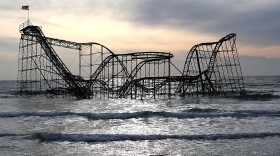
Robert Smith
Robert Smith is a host for NPR's Planet Money where he tells stories about how the global economy is affecting our lives.
If that sounds a little dry, then you've never heard Planet Money. The team specializes in making economic reporting funny, engaging and understandable. Planet Money has been known to set economic indicators to music, use superheroes to explain central banks, and even buy a toxic asset just to figure it out.
Smith admits that he has no special background in finance or math, just a curiosity about how money works. That kind of curiosity has driven Smith for his 20 years in radio.
Before joining Planet Money, Smith was the New York correspondent for NPR. He was responsible for covering all the mayhem and beauty that makes it the greatest city on Earth. Smith reported on the rebuilding of Ground Zero, the stunning landing of US Air flight 1549 in the Hudson River and the dysfunctional world of New York politics. He specialized in features about the overlooked joys of urban living: puddles, billboards, ice cream trucks, street musicians, drunks and obsessives.
When New York was strangely quiet, Smith pitched in covering the big national stories. He traveled with presidential campaigns, tracked the recovery of New Orleans after Hurricane Katrina and reported from the BP oil spill.
Before his New York City gig, Smith worked for public radio stations in Seattle (KUOW), Salt Lake City (KUER) and Portland (KBOO). He's been an editor, a host, a news director and just about any other job you can think of in broadcasting. Smith also lectures on the dark arts of radio at universities and conferences. He trains fellow reporters how to sneak humor and action into even the dullest stories on tight deadlines.
Smith started in broadcasting playing music at KPCW in his hometown of Park City, Utah. Although the low-power radio station at Reed College in Portland, Oregon, likes to claim him as its own.
-
 A Locked Door, A Secret Meeting And The Birth Of The FedThe creation of America's central bank includes a bunch of bankers locked in a private library and a secret trip to a place called Jekyll Island.
A Locked Door, A Secret Meeting And The Birth Of The FedThe creation of America's central bank includes a bunch of bankers locked in a private library and a secret trip to a place called Jekyll Island. -
There is a whole world of commerce inside a traffic jam in the Indonesian capital, Jakarta, and the shrewdest businessmen are the teenage boys.
-
NPR's Planet Money team has manufactured a T-shirt. All this week we're following its journey around the globe. Today, the T-shirt makes a detour in the Pacific Ocean. Cotton from America gets shipped to a factory in Indonesia where it gets transformed into yarn.
-
Prize In Economics A Latecomer To Nobel LineupThe Nobel Prize in economics will be announced Monday morning in Sweden. This prize is a relatively new one — it was established in 1968 by Sweden's central bank. The prizes announced last week, like the Nobel Peace Prize, were established more than 100 years ago in Alfred Nobel's will.
-
This week, we visited the factory in Indonesia where U.S. cotton was spun into yarn for the Planet Money T-shirt.
-
When he was a kid, writer Chris Grabenstein loved tourist towns, so he set novels in one of his favorites — the Jersey shore. He says one of the great joys of writing is coming up with an interesting place to drop the body, like a roller coaster or a tilt-a-whirl.
-
The Beige Book — a big, official report — is mostly a bunch of stories gathered by talking to businesses around the country.
-
A definitive answer to one of the most important questions in the history of finance.
-
Coca-Cola is returning to Myanmar after 60 years. They'd been kept out of the country by international sanctions. This week they officially opened their new plant outside of Yangon.
-
In Myanmar — a country that's been cut off from the world for decades — it's still a surprise when money pops out of the ATM. That may soon change.








